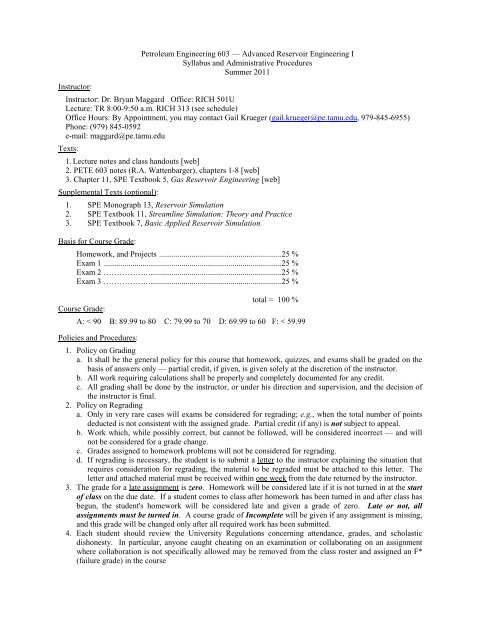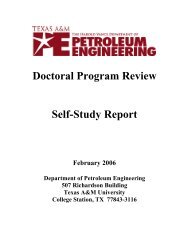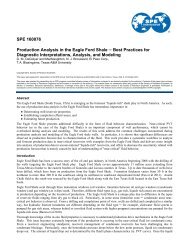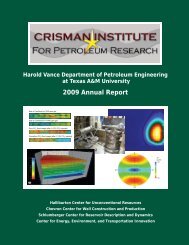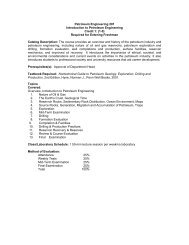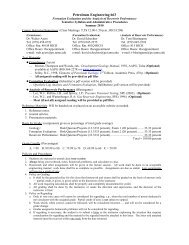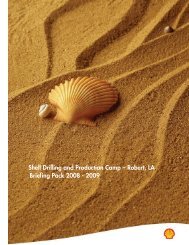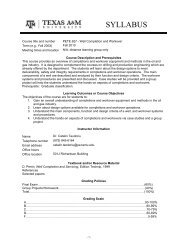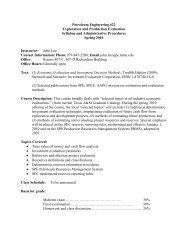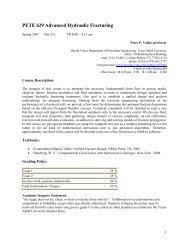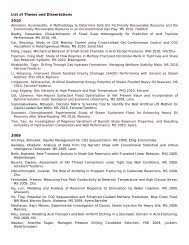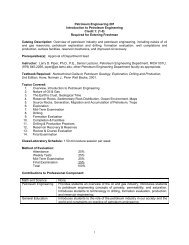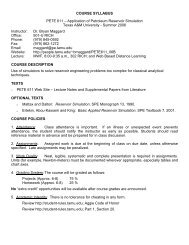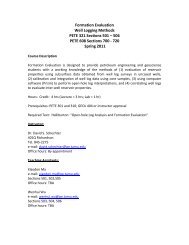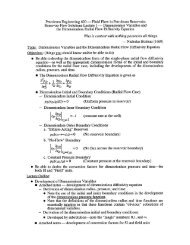PETE 603 Advanced Reservoir Engineering
PETE 603 Advanced Reservoir Engineering
PETE 603 Advanced Reservoir Engineering
You also want an ePaper? Increase the reach of your titles
YUMPU automatically turns print PDFs into web optimized ePapers that Google loves.
Instructor:<br />
Petroleum <strong>Engineering</strong> <strong>603</strong> — <strong>Advanced</strong> <strong>Reservoir</strong> <strong>Engineering</strong> I<br />
Syllabus and Administrative Procedures<br />
Summer 2011<br />
Instructor: Dr. Bryan Maggard Office: RICH 501U<br />
Lecture: TR 8:00-9:50 a.m. RICH 313 (see schedule)<br />
Office Hours: By Appointment, you may contact Gail Krueger (gail.krueger@pe.tamu.edu, 979-845-6955)<br />
Phone: (979) 845-0592<br />
e-mail: maggard@pe.tamu.edu<br />
Texts:<br />
1. Lecture notes and class handouts [web]<br />
2. <strong>PETE</strong> <strong>603</strong> notes (R.A. Wattenbarger), chapters 1-8 [web]<br />
3. Chapter 11, SPE Textbook 5, Gas <strong>Reservoir</strong> <strong>Engineering</strong> [web]<br />
Supplemental Texts (optional):<br />
1. SPE Monograph 13, <strong>Reservoir</strong> Simulation<br />
2. SPE Textbook 11, Streamline Simulation: Theory and Practice<br />
3. SPE Textbook 7, Basic Applied <strong>Reservoir</strong> Simulation<br />
Basis for Course Grade:<br />
Homework, and Projects ............................................................ 25 %<br />
Exam 1 ....................................................................................... 25 %<br />
Exam 2 …………….. ................................................................. 25 %<br />
Exam 3 …………….. ................................................................. 25 %<br />
Course Grade:<br />
total = 100 %<br />
A: < 90 B: 89.99 to 80 C: 79.99 to 70 D: 69.99 to 60 F: < 59.99<br />
Policies and Procedures:<br />
1. Policy on Grading<br />
a. It shall be the general policy for this course that homework, quizzes, and exams shall be graded on the<br />
basis of answers only — partial credit, if given, is given solely at the discretion of the instructor.<br />
b. All work requiring calculations shall be properly and completely documented for any credit.<br />
c. All grading shall be done by the instructor, or under his direction and supervision, and the decision of<br />
the instructor is final.<br />
2. Policy on Regrading<br />
a. Only in very rare cases will exams be considered for regrading; e.g., when the total number of points<br />
deducted is not consistent with the assigned grade. Partial credit (if any) is not subject to appeal.<br />
b. Work which, while possibly correct, but cannot be followed, will be considered incorrect — and will<br />
not be considered for a grade change.<br />
c. Grades assigned to homework problems will not be considered for regrading.<br />
d. If regrading is necessary, the student is to submit a letter to the instructor explaining the situation that<br />
requires consideration for regrading, the material to be regraded must be attached to this letter. The<br />
letter and attached material must be received within one week from the date returned by the instructor.<br />
3. The grade for a late assignment is zero. Homework will be considered late if it is not turned in at the start<br />
of class on the due date. If a student comes to class after homework has been turned in and after class has<br />
begun, the student's homework will be considered late and given a grade of zero. Late or not, all<br />
assignments must be turned in. A course grade of Incomplete will be given if any assignment is missing,<br />
and this grade will be changed only after all required work has been submitted.<br />
4. Each student should review the University Regulations concerning attendance, grades, and scholastic<br />
dishonesty. In particular, anyone caught cheating on an examination or collaborating on an assignment<br />
where collaboration is not specifically allowed may be removed from the class roster and assigned an F*<br />
(failure grade) in the course
2<br />
Course Description<br />
This course includes basic equations, derivations and underlying principles used in reservoir modeling.<br />
Prerequisites by Topic<br />
• Differential and integral calculus.<br />
• Ordinary and partial differential equations.<br />
• Fluid dynamics and heat transfer.<br />
• <strong>Reservoir</strong> fluid properties.<br />
• <strong>Reservoir</strong> petrophysics.


